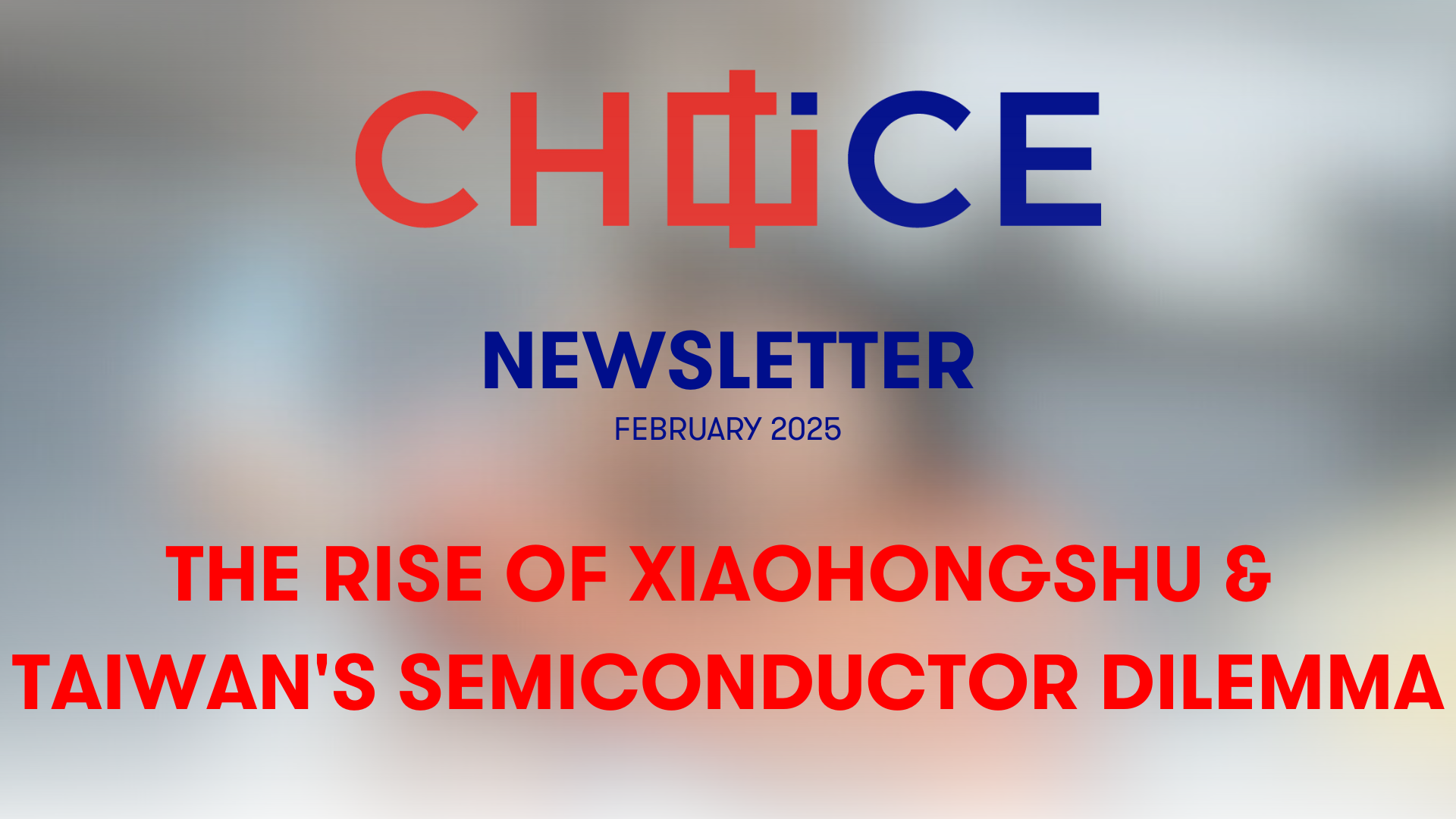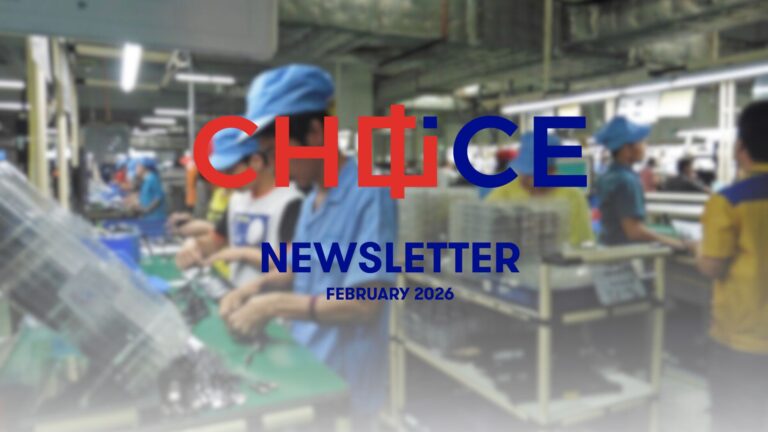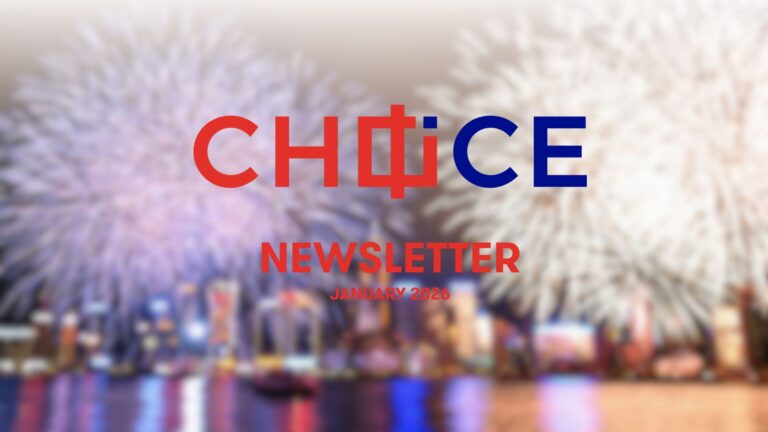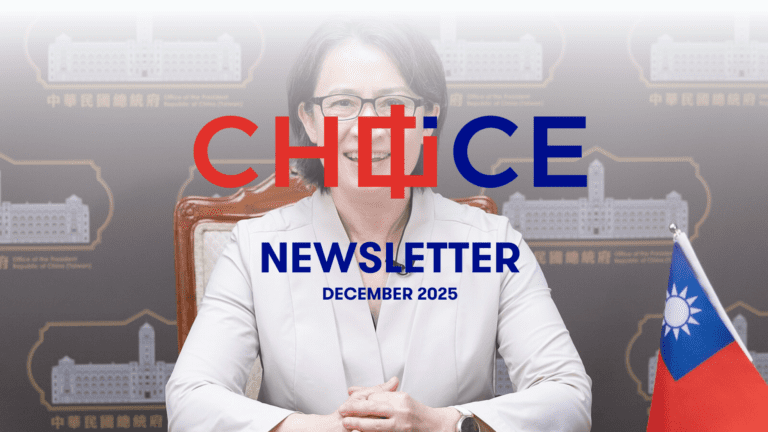CHOICE Newsletter: The Rise of Xiaohongshu & Taiwan’s Semiconductor Dilemma

Dear Reader,
Welcome to the second issue of 2025. Building on our previous coverage of TikTok’s role in Romania’s presidential elections, this issue shifts focus to another Chinese social media platform that is gaining significant attention: Xiaohongshu (小红书), also known as RedNote.
Meanwhile, the return of Donald Trump to office and his announcement of tariffs on imported chips pose significant challenges to Taiwan and its export-oriented economy, which relies heavily on high-tech industries.
We are delighted to welcome our new colleague, Chu Yang, who joins us from Denmark. Specializing in Chinese political discourse and media ecosystems, Chu will be an invaluable addition to our team. Welcome on board, Chu!
Additionally, we are pleased to introduce our new CHOICE Fellows: Ágnes Szunomár, Head of the Institute of Global Studies at Corvinus University of Budapest; Konstantinas Andrijauskas, Associate Professor of Asian Studies and International Politics at Vilnius University; and Stefan Vladisavljev, Program Director of Foundation BFPE for a Responsible Society.
CHOICE Take

From TikTok to Xiaohongshu: China’s Growing Influence Through Lifestyle Platforms
For too long, discussions about China’s political influence on social media have primarily focused on TikTok and its global popularity. Recently, as TikTok faced a potential US ban, the migration of American users has brought another Chinese social media platform into the spotlight: Xiaohongshu. Launched in 2013, this Chinese e-commerce and lifestyle platform has largely flown under the radar – until now.
On January 12, 2025, the US Supreme Court upheld a ruling requiring TikTok to divest from ByteDance by January 19 or face a complete ban in the US. Within days, Xiaohongshu became the most downloaded app on the US App Store. According to Reuters, more than 700,000 new users joined the platform in just two days. The “TikTok refugee” hashtag emerged as a cultural phenomenon, generating over 58,000 posts. A livestream chat room titled “TikTok Refugees” drew over 727,300 participants, including both American and Chinese users.
Valued at $17 billion, Xiaohongshu combines social media and e-commerce with a focus on lifestyle content and product recommendations, all powered by TikTok-style algorithms. With over 300 million monthly active users – predominantly young women – the platform’s influence goes far beyond its seemingly apolitical nature. It plays a significant role in shaping gender-related conversations within China’s digital sphere and, as one of the most widely used apps among overseas Chinese communities, significantly influences both China’s international image and Chinese perceptions of the world.
The platform’s nationalist influence is particularly evident in its cultural content. For instance, discussions around traditional Hanfu clothing have become a powerful vector for nationalist sentiment. Hashtags like “文化输出” (Cultural export) or “华流才是顶流” (Chinese trend is the top trend) have amassed hundreds of millions of views. When luxury brand Dior was accused of appropriating the traditional Chinese “horse face skirt” design last year, Xiaohongshu was a major platform that amplified the issue, turning a fashion dispute into a nationalist debate. Hashtags like “马面裙是中国的” (The horse face skirt belongs to China), amassing 27 million views, and “支持国货” (Support domestic products), amassing 1.7 billion views, linked the controversy to broader themes of cultural ownership and national pride, demonstrating how Xiaohongshu’s lifestyle-focused content can effectively mobilize nationalist sentiment.
The recent influx of American users adds a new dimension to these dynamics. While many Chinese users welcomed the newcomers with enthusiasm, some also offered guidance on platform rules, cautioning against discussing sensitive topics that might trigger censorship. Unlike TikTok, which operates as an international subsidiary with a separate app for Chinese users, Xiaohongshu is a purely Chinese platform adhering strictly to Chinese regulations. A leaked internal document from 2022 revealed the platform’s extensive content control system, including detailed protocols for monitoring and censoring “sudden incidents” such as accidents, natural disasters and political disturbances. As a result, international users are directly exposed to state-sanctioned narratives, particularly around sensitive issues like Xinjiang and Taiwan, and domestic political issues such as LGBTQ rights. Although Xiaohongshu currently lacks robust English-language content moderation, it is rapidly building this capability, as indicated by job postings for English-language moderators.
The TikTok migration has sparked worldwide interest in Xiaohongshu that extends beyond the United States, including Central and Eastern European states such as the Czech Republic. While the platform is unlikely to match TikTok’s direct impact on political campaigns, its influence operates more subtly through lifestyle content and cultural narratives. This could effectively target influencers and young audiences that are already in the sights of Chinese propaganda efforts. Additionally, the platform’s strict content moderation policies and limited English-language oversight raise significant compliance concerns under European regulations. Its ability to shape perceptions on sensitive issues, coupled with its popularity among diaspora communities, may also influence public discourse in ways that traditional political content monitoring might struggle to address.
By Chu Yang, CHOICE Analyst (based in Denmark)
Taiwan in Focus
Is Taiwan ready to trade semiconductors to please Donald Trump?
In its asymmetric response to growing threats from China, Taiwan traditionally relies on high technology as its main asset in the global economy: semiconductors. Indeed, the US imports nearly half of its chips from the island, which are crucial for the supply chains of companies like Apple and Nvidia.
However, on January 27, freshly re-elected US president Donald Trump announced plans to impose tariffs of up to 100 percent on imported chips. This carrot-and-stick policy, successfully tested with Colombia to curb illegal migration to the US, is now aimed at pressuring Taiwan to build more chip production plants in the US – or else face crippling tariffs.
This situation represents a significant challenge for Taiwan: semiconductors account for about 15 percent of the country’s GDP. And while Taiwan’s main chip producer TSMC has announced plans to start production in Arizona in 2025, Trump does not seem convinced this will be enough to satisfy his demands.
Competition from China in high technology and AI is proving damaging to the US economy. Just a week after Beijing released its new, much cheaper AI platform – DeepSeek – Nvidia, a company founded in the US by Taiwanese entrepreneur Jensen Huang, a pioneer in AI before the launch of ChatGPT, lost 17 percent of its stock value in a single day on January 27. For the US, maintaining leadership in AI depends on lowering the cost of high-quality chips.
The question is: does Taiwan trust this new Trump administration – unpredictable as it remains on its China policy – enough to relinquish its near-monopoly on high-end chips?
By Filip Noubel, CHOICE Analyst (based in Taipei)
CHOICE News
 We are launching Stíny Číny, a new podcast for Czech listeners exploring China’s politics, economy, and global influence. Every two weeks, we bring expert discussions on how China shapes the world and its impact on Europe and the Czech Republic. (listen on Spotify)
We are launching Stíny Číny, a new podcast for Czech listeners exploring China’s politics, economy, and global influence. Every two weeks, we bring expert discussions on how China shapes the world and its impact on Europe and the Czech Republic. (listen on Spotify)
 We are proud to announce that our CHOICE analyst Dominika Remžová will be presenting at this year’s World Congress of Taiwan Studies (WCTS) in Taipei as well as the British International Studies Association (BISA) conference in Belfast.
We are proud to announce that our CHOICE analyst Dominika Remžová will be presenting at this year’s World Congress of Taiwan Studies (WCTS) in Taipei as well as the British International Studies Association (BISA) conference in Belfast. China’s selective visa-free policy has political as well as economic motives. Ivana Karásková highlights for VOA Chinese how diplomatic tensions, particularly regarding Taiwan, have led to the exclusion of countries like the Czech Republic from the scheme. (read the full article)
China’s selective visa-free policy has political as well as economic motives. Ivana Karásková highlights for VOA Chinese how diplomatic tensions, particularly regarding Taiwan, have led to the exclusion of countries like the Czech Republic from the scheme. (read the full article) China is using electric vehicles as both an economic driver and a political tool. Dominika Remžová explains in Hospodářské noviny how Beijing leverages EV exports to expand its global influence, particularly in Central Europe. (read it here)
China is using electric vehicles as both an economic driver and a political tool. Dominika Remžová explains in Hospodářské noviny how Beijing leverages EV exports to expand its global influence, particularly in Central Europe. (read it here)
 CMeet nine of our WiCH (Women Insight on China) co-chairs from across Europe as they share their motivations for joining the initiative, their areas of expertise, and their vision for strengthening the role of women in China studies. (watch the video to learn more)
CMeet nine of our WiCH (Women Insight on China) co-chairs from across Europe as they share their motivations for joining the initiative, their areas of expertise, and their vision for strengthening the role of women in China studies. (watch the video to learn more)
 We’re on Bluesky! Stay updated with our latest articles, insights, and news by following our account – don’t miss out on valuable content and updates. (follow us here)
We’re on Bluesky! Stay updated with our latest articles, insights, and news by following our account – don’t miss out on valuable content and updates. (follow us here)
This is the web version of our newsletter. If you’d like to receive the CHOICE newsletter in advance, straight to your inbox, sign up here:
Written by
CHOICE
CHOICE is a multinational consortium of experts providing informed analysis on the rising influence of the People’s Republic of China within the countries of Central and Eastern Europe (CEE).


